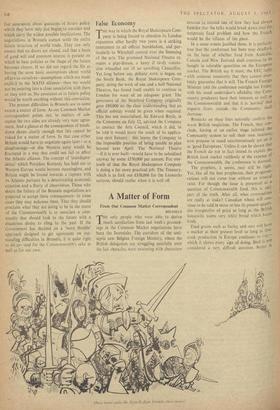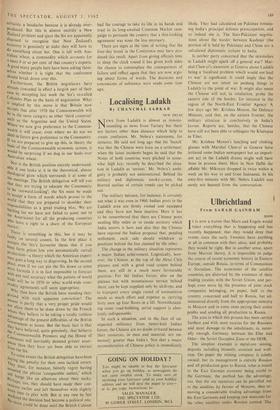A Matter of Form
From Our Common Markel Correspondent
BRUSSELS
ttE only people who were able to derive I much satisfaction from last week's proceed- ings in the Common Market negotiations have been the Jeremiahs. The corridors of the anti- septic new Belgian Foreign Ministry, where the British delegation are struggling painfully over the last obstacles, were swarming with characters anxious to remind one of how they had always forecast that the talks would break down over the• temperate food problem and how the French would be the villains of the piece.
In a sense events justified them. It is perfectlY true that the conference has been near deadlock
on the issue of whether food from Australia,' Canada and New Zealand shall continue to be bought in tolerable quantities on the European market. The British say it must; the EEC reply with ominous unanimity that they cannot abso- lutely guarantee that it will. The French Foreign Minister told the conference outright last Friday,. with his usual undertaker's affability that Corn-, munity producers have their interests as well as the Commonwealth and that it is 'normal* that imports from outside the Community shall decrease.
Remarks on these lines naturally confirm the worst British suspicions. The French, they con'. elude, having at an earlier stage tailored the Community system to suit their own interests,: now prOpose to stand sanctimoniously pat on it as 'good Europeans.' Unless it can be shown that the French do not in fact intend to exploit the • British food market ruthlessly at the expense of the Commonwealth, the conference is doomed-
The prophets, it seems, may still be right. Yet, like all the best prophecies, their prognosti- cations will not come true without an ironical twist. For though the issue is presented as question of Commonwealth food, this is onlY part of the truth. After all, what commodities are really at stake? Canadian wheat will CO tinue to be sold in more or less its present quanti- ties irrespective of price so long as the British: housewife wants very white bread which keel's fresh.
Feed grains such as barley and oats will have a market at their present level so long as live" stock production in Europe continues to risc-7- which it shows every sign of doing. Beef is not considered a very difficult question. Butter is Uitre 111,11"C 1111to the breach. doter frieadA, once ap.,re: certainly a headache because it is already over- Produced. But this is almost entirely a New Zealand problem and since the Six are apparently disposed to recognise that New Zealand's economy is genuinely at stake they will have to do something about her. One is left with Aus- tralian wheat, a commodity which accounts for a mere 8 or so per cent. of that country's exports. A good many people here have been asking them- selves whether it is right that the conference should break down over this.
Furthermore, the British negotiators have already conceded in effect a largish part of their Case by accepting last week the Six's so-called Colombo Plan as the basis of negotiation. What is implied by this move is that Britain 'now accepts that after 1970 the Commonwealth will be in the same category as other 'third countries' such as the Argentine and the United States. Where we now give preference to the Common- wealth it will cease; even where we do not we shall in future give preference to the Community. If We are prepared to give up this, in theory the basis of the Commonwealth economic system, it Would be surprising if we dug in our heels over Australian wheat.
or is the British position entirely understand- able if one looks at it in the theoretical, almost `liealogical glow which surrounds it at some of the meetings. The British delegation will tell you that they are trying to educate the Community to be 'outward-looking'; the Six must be made t„t) accept a form of words which proves to the world that they are prepared to shoulder their responsibilities as a great trading bloc. We are battling (as we have not failed to point out to .._.`"e Americans) for all the producing countries who have a right to a share of the European Market.
faulty is something in this, but it may be 14 on several counts. In the first place it accepts the Six's favourite thesis that if you keep farm prices low you automatically curtail production--a theory which the American experi- ence goes a long way to disproving. In the second ce, even if we can pin the Six down to sotne strict formula it is in fact impossible to forecast With any real accuracy what the pattern of world :de Will be in 1970 or what world-wide corn- (WY agreements will seem appropriate. why then have the British been standing their ground with such apparent conviction? The an swer is partly that a very proper pride would not allow "w them to be done down by the French om they believe to be taking a totally ruthless -i_aavantage of the present difficulties of the British Government at home. But the basic fact is that CCoCommonwealth have believed, quite genuinely, that hitherto o Commonwealth Premiers an,¢ the House of atrihrnons will inevitably demand greater assur- ,:'es than they have yet been able to extract
-worn the Six.
paTO some extent the British delegation have been ThYin8 the penalty for their own tactical errors. Y must, for instance, bitterly regret having vented the phrase 'comparable outlets,' which still hangs like perh gs like an albatross about their necks. essi„.413s, too, they should have made their con-
nitor.'fis earlier and left themselves with slightly
weeke tillite to play with. But at any rate by last No credo the decision had become a political one.
iii°re could be done until the British Cabinet
had the courage to take its life in its hands and trust to its-long-awaited Common Market cam- paign to persuade the country that a thin-looking agreement was none the less necessary.
There are signs at the time of writing that the four-day break in the Conference may have pro- duced this result. Apart from giving officials time to sleep the clock round it has given both sides the chance to contemplate the consequences of failure and reflect again that they are now argu- ing about forms of words. The decisions and concessions of substance were made some time ago.































 Previous page
Previous page